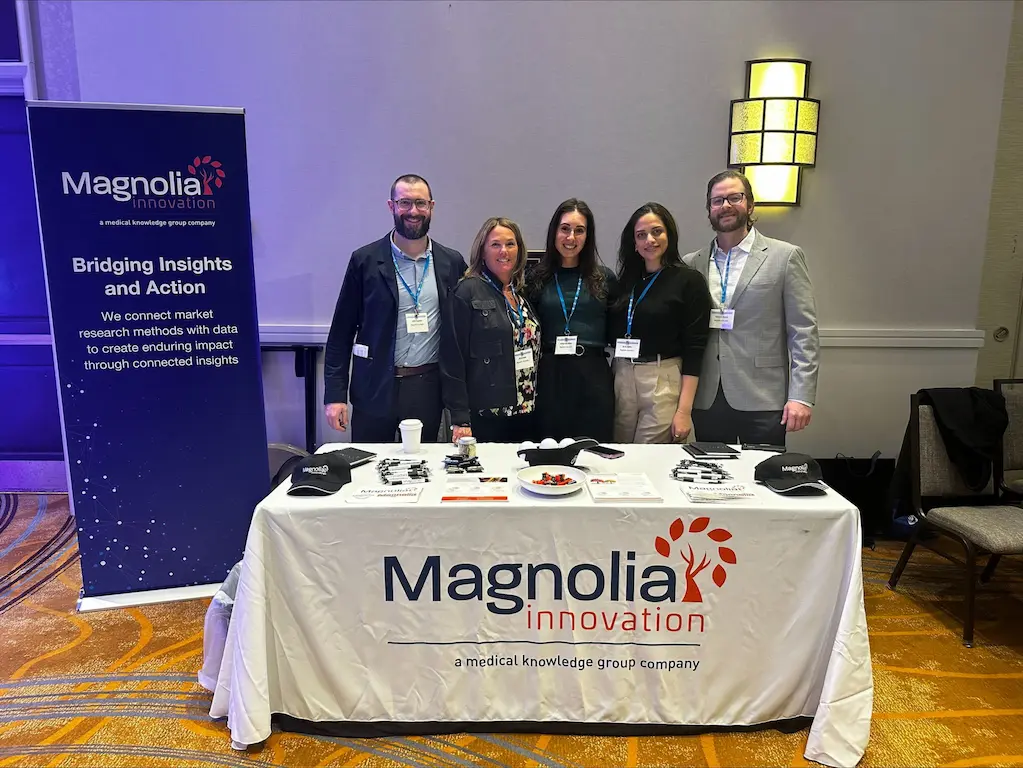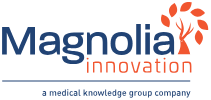
Key Takeaways from PMRC 2025: What’s Next for Pharma Market Research?
The Magnolia Innovation team—Ken Howie (Partner), Jill Arnese (Partner), Alexandra Wilds (Associate Partner), Arun Sidhu (Associate Partner), and John Capano (Head of Innovation and Technology)—recently attended the Pharma Market Research Conference (PMRC) 2025, where industry leaders tackled the latest trends and challenges shaping pharma market research. From AI’s expanding role to the growing influence of behavioral research and knowledge management, the event offered powerful insights into the future of the industry. Our team engaged directly with key stakeholders, uncovering innovative methodologies and strategic approaches that will help pharma companies stay ahead in an increasingly complex landscape. Below, we dive into the major takeaways and their implications for the future of pharma market research.
The Pharma Market Research Conference (PMRC) 2025 provided a window into how the industry is evolving. The discussions reflected a mix of optimism and caution—AI continues to gain traction, but many are still figuring out how to apply it effectively. Behavioral research techniques are being explored more deeply, and the growing challenge of insight management is pushing organizations to rethink how they store and use data.
The conversation is shifting from collecting more data to using it more effectively—a challenge that market research teams, service providers, and pharma companies alike are working to solve. Here are the key takeaways from PMRC 2025 and what they mean for pharma market research moving forward.
AI in Market Research: Moving from Concept to Application
AI is no longer just an interesting possibility—it’s being integrated into market research in meaningful ways. Companies are exploring AI to analyze large datasets, speed up decision-making, and reduce costs, with some even relying on secondary data alone for early-stage insights.
But skepticism remains. Concerns about accuracy, reliability, and the limits of generative AI were common themes at PMRC. Many teams recognize the potential of AI but need clearer guidance on when and how to use it effectively. There’s also a growing need to ensure that AI complements—not replaces—human analysis.
One area where AI is gaining traction is qualitative research, where it’s being used to identify sentiment and patterns in large volumes of unstructured data. However, these tools still require human oversight to interpret findings and apply them strategically.
What Pharma Companies Should Be Thinking About:
- Where does AI add the most value in market research, and where is human analysis still critical?
- How can teams ensure AI-generated insights are accurate, actionable, and ethically applied?
- What strategies can help balance the efficiency of AI with the depth of traditional research?
Beyond AI: The Role of Behavioral and Cognitive Research Techniques
AI isn’t the only methodology evolving. Behavioral research and cognitive science are playing a larger role in pharma market research, particularly in understanding how patients and HCPs make decisions.
At PMRC, discussions centered on how linguistics, sentiment analysis, and behavioral modeling can help uncover the motivations behind decision-making. This is especially relevant for communication testing and patient engagement strategies, where understanding emotional responses can shape messaging.
One interesting development is the combination of AI and behavioral research. Some companies are exploring ways to train AI models using behavioral frameworks, allowing them to interpret qualitative responses through a cognitive science lens. This could offer a new way to extract deeper meaning from traditional research methods.
What Pharma Companies Should Be Thinking About:
- How can behavioral research improve how patient and HCP insights are gathered and applied?
- What role does sentiment analysis play in refining messaging and engagement strategies?
- How can AI and behavioral research complement each other to improve qualitative research?
Managing and Connecting Insights More Effectively
A recurring theme at PMRC was how difficult it has become for teams to manage and connect research insights across different projects and teams. Many companies are accumulating vast amounts of research but struggle to organize it in a way that makes it easy to access and apply.
Some companies are investing in internal knowledge management platforms with search capabilities that allow teams to find insights more quickly. This reflects a growing need for market research to be structured in a way that enables smarter decision-making—not just stored for reference.
Beyond storage, connecting insights across multiple research sources is becoming a priority, particularly for new product planning teams that need to synthesize findings from diverse datasets. As pharma companies collect more data, ensuring these insights are linked in a meaningful way will be key.
To address this challenge, Magnolia Innovation offers the Scout Report, a comprehensive solution designed to connect multiple insight sources—such as primary research, competitive intelligence, claims data, and other secondary resources—into a structured scorecard. This enables pharma companies to efficiently triangulate insights and make more informed strategic decisions.
What Pharma Companies Should Be Thinking About:
- How easy is it to access and connect past research across different teams?
- What systems are in place to ensure insights are applied rather than just archived?
- How can research outputs be structured to support real-time decision-making?
New Approaches in Qualitative & Quantitative Research
The way research is conducted is also changing. At PMRC, several emerging methodologies stood out:
- Behavioral research techniques are being used to refine qualitative studies and communication testing, helping to ensure messaging resonates with target audiences.
- Data archiving—specifically, storing qualitative interviews for long-term trend analysis—allows teams to track sentiment shifts among key stakeholders over time.
- AI-powered chatbots are being explored as virtual moderators in research studies, providing follow-ups and helping teams uncover the reasons behind quantitative trends.
- Real-time research methodologies are gaining traction, enabling pharma brands to react quickly to market changes and stay ahead of competitors.
While these innovations are still evolving, they show how technology and behavioral science are shaping the future of market research methodologies.
What Pharma Companies Should Be Thinking About:
- How can qualitative research be adapted to incorporate behavioral science techniques?
- What role does data archiving play in long-term market research planning?
- Can virtual moderators and chatbots enhance qualitative insights, or are they better suited for specific types of research?
Moving Forward: What’s Next for Pharma Market Research?
The discussions at PMRC reflected a need for market research to be more connected, faster, and strategically applied. AI and behavioral research are opening up new opportunities, but the core challenges remain the same: How do we make insights more accessible, more actionable, and more relevant to real-world decision-making?
As research teams look ahead, a few key priorities stand out:
- Using AI responsibly—ensuring insights are reliable and interpreted with human oversight.
- Improving knowledge management—so past research is easily accessible and applicable.
- Bringing together multiple research sources—to create a more complete picture of market dynamics.
- Adapting research methodologies—to incorporate behavioral insights and emerging technologies.
- Implementing agile research strategies—to stay ahead in an industry that moves at an increasingly rapid pace.
The companies that can successfully integrate these priorities into their market research approach will be well-positioned to navigate the increasing complexity of the pharma landscape.
Let’s Continue the Conversation
Pharma market research is changing, and staying ahead requires a thoughtful approach to AI, behavioral research, and knowledge management.
Magnolia Innovation is uniquely positioned to help pharma companies navigate these challenges. With our deep expertise in insight generation, knowledge management, and AI-driven research, we help clients maximize the impact of their market research investments.
If your team is thinking about how to evolve its market research strategy, let’s talk. How can we help you optimize insight generation, connectivity, and decision-making in 2025?
